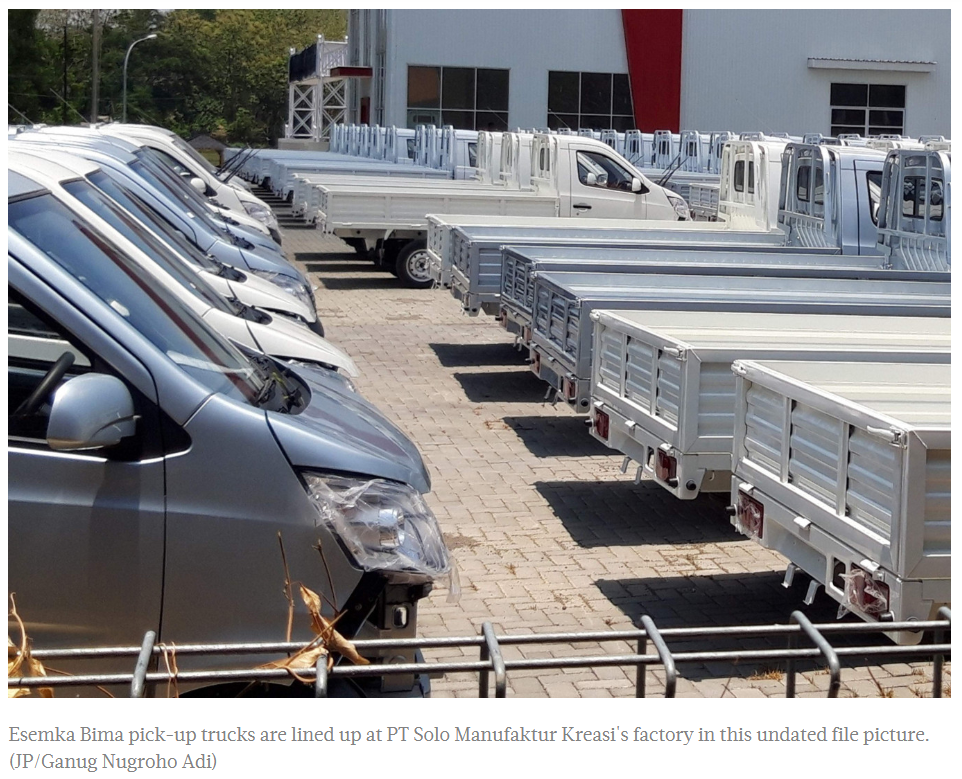Indonesia’s factory activity in deepest-ever contraction as pandemic disrupts supply, demand
Indonesia’s factory production contracted by a record level in the first quarter of the year as a result of weak demand and disruption to the supply chain against the backdrop of the coronavirus pandemic, the latest survey has shown.
Bank Indonesia’s Prompt Manufacturing Index (PMI-BI) was recorded at 45.64 percent, the lowest level ever, compared with 51.5 percent in the fourth quarter of 2019. An index reading above 50 indicates expansion while below 50 reflects contraction.
The contraction was seen in all component indexes. The order volume index was at 47.28 percent, production volume index at 43.1 percent, goods stock volume at 46.69 percent and the manpower index at 47.63 percent.
“The contraction in all of the PMI-BI components was caused by slower demand and a disrupted supply chain as a result of COVID-19,” the central bank said in a statement.
Manufacturing industry contributed around 19 percent of Indonesia’s gross domestic product (GDP), which grew by 4.97 percent in the fourth quarter last year, the slowest in four years. Economic growth is expected to reach 2.3 percent this year, a 21-year low, with a possibility of contracting by 0.4 percent contraction under the worst-case scenario, government forecasts estimate.
BI Governor Perry Warjiyo said on April 9 that GDP growth would reach 4.7 percent in the first quarter but would weaken to 1.1 percent in the second quarter as the government implements stricter COVID-19 containment measures. Growth is seen at 1.3 percent in the third quarter and 2.4 percent in the fourth quarter.
The virus has infected more than 1.8 million people around the globe including 4,241 in Indonesia, forcing factories, shops and schools to close amid government-imposed lockdowns and social restrictions. This has upended supply chains and crushed demand for goods as consumers stay at home worried about job prospects, reining in consumer spending, which accounts for nearly 60 percent of Indonesia’s GDP.
According to the BI-PMI survey, almost all sectors of manufacturing have tumbled in the first quarter except for food, beverages and tobacco. However, the central bank projects an improvement in factory activity in the second quarter due to increasing volume in factories.
“Manufacturing activities will slightly recover in the second quarter of 2020 to 48.79 percent,” the central bank projected. “The recovery will be driven by expansion in the order volume and goods stock volume indices.”
BI’s survey was largely in line with IHS Markit’s Purchasing Managers Index (PMI), the gauge for manufacturing activities. Indonesia’s PMI slumped to 45.3, the worst in the survey’s nine-year history.
“Under stricter antivirus measures, demand weakened sharply at the end of the first quarter. New business inflows fell at the fastest rate in the series history, dragged down by a plunge in export sales,” the survey statement reads.
“At the same time, factory shutdowns led to a marked drop in production, with output also falling at a survey record rate.”
Indonesia has implemented large scale social restrictions (PSBB) measures within the capital city Jakarta, the nation’s virus epicenter, to contain COVID-19. The measures include closing down schools and public places, prohibiting crowds gathering and restricting mobility and commercial activity to those serving essential needs only.
Source: https://www.thejakartapost.com/news/2020/04/13/indonesias-factory-activity-in-deepest-ever-contraction-as-pandemic-disrupts-supply-demand.html


 English
English




